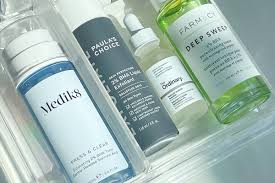
Skincare Benefits of Salicylic Acid – Why Is Salicylic Acid Good for Skin?
Salicylic acid isn’t new to the beauty industry but has kept a loyal following of beauty experts, journalists, facialists and everyday beauty fans. With its ability to fight off blemishes, buff away dead skin cells and battle against excess oil, it’s no wonder this acid is considered a skin saviour.
Even if you haven’t used or even heard of salicylic acid, you’ll be falling over yourself to grab some. Read on to find out more about this skin-changing knight in a bottle.
What is Salicylic Acid?
Salicylic acid is the only known and researched Beta Hydroxy Acid, also called BHA, and is derived from aspirin or willow bark. It differs to other Alpha Hydroxy Acids (AHA), such as glycolic acid, as salicylic works further down in the layers of the skin enabling it to unclog the pores of debris, bacteria and other germs that build up to cause blemishes and breakouts.
Now for the science, knowing the structure of salicylic acid will help you understand how it differs to AHAs and some of its benefits. Beta Hydroxy Acid means the molecule of the hydroxy is separated from the acid by two carbon atoms, instead of one like Alpha Hydroxy Acids, this then makes the structure more oil soluble.
It’s the structure of the acid that makes it so powerful, with it being oil soluble meaning it can work its way down into the layers of the skin and tackle the “glue” that holds the dead skin cells together. If left and not exfoliated away these cells are able to build up and develop into blemishes, such as spots, rough patches of skin and skin that can appear quite dull. By doing this it makes it easier for these cells to be removed, revealing a glowing complexion of new skin!
What Are the Skin Benefits of Salicylic Acid?
There are many skin benefits that salicylic acid is able to provide, the most popular would be its ability to tackle spots and other breakouts, here is some more information on the benefits of salicylic acid for your skin.
It Exfoliates the Skin
Salicylic acid provides a great deal of exfoliation, it varies from AHA in the way it is oil soluble and can penetrate down into the lower layers of the skin. It works at unclogging the pores and loosening the bonds that hold dead skin cells together, making it difficult to be sloughed away with a manual scrub.
It Fights Against Blackheads and Whiteheads
As previously mentioned, Salicylic acid works lower in the skin and makes cleansing the skin of debris, bacteria and product build-up light work. This means blemishes such as blackheads and whiteheads are treated and cleared a lot more effectively than say cyst or other under the surface pimples. It does help a little due to its antibacterial and anti-inflammatory properties which can clam breakouts as well as reduce its size and redness
It Gives the Skin A Deep Cleanse
Salicylic acid’s ability to be oil-soluble allows it to make its way further into the skin working on dissolving the desmosomes, which is the glue that holds the dead skin cells together. Unlike AHA, which exfoliate the outer layer of the skin, BHA works at exfoliating and clearing deeply into the pores allowing the skin to become more clear by working deeply into the pores allowing the skin to heal itself from within.
How Do You Use Salicylic Acid?
Salicylic acid is available in a vast array of products, from face masks, gels, washes, cleansers and many more. This is beneficial by allowing you to find the right salicylic acid product that fits into your routine, with the correct percentage of salicylic acid their skin can tolerate. There are a couple of dos and don’ts when it comes to using salicylic acid and here are some of them:
The Do’s
Find the right product containing salicylic acid that works best for you and your skin
Introduce salicylic acid slowly into your routine to avoid any skin irritation, start by using the BHA twice a week
Use over the counter products containing 0.5% – 2% of salicylic acid
Contact your GP or dermatologist if you have any concerns or needed medical advice before introducing salicylic acid to your routine.
Use salicylic acid if you have blemish-prone skin
Use BHA and AHA together, both of these acids work in different layers of the skin so it won’t be too much for the skin if used the correct amount.
The Don’ts
Don’t use salicylic acid whilst on certain medications such as blood thinners
Don’t use salicylic acid during pregnancy or breastfeeding
Don’t apply salicylic acid on broken skin, such as cuts and scrapes, remembering to avoid the mouth, eyes and nose.
Don’t use salicylic acid too often as will create skin sensitivity and dryness
Don’t use salicylic acid on broken skin
Which Skin Types Can use Salicylic Acid?
Oily and Blemish Prone Skin Type
Salicylic Acid’s excellent exfoliating and antibacterial properties make it, without a doubt, acne’s enemy. Oily and blemish-prone skin is treated by dissolving excess sebum, the natural oil found in your skin, bacteria and debris that can block pores resulting in blackheads and other spots.
These can be treated with over the counter products, if however cystic acne is a concern there is the option of having stronger products that can be prescribed by a dermatologist or medical professional.
Dry Skin Type
Dry and sensitive skin types should use salicylic acid with caution. This is a very powerful BHA and can lead to irritation very quickly if used too regularly.
If you have dry skin, but you’d still like to use BHA for it’s cleansing and exfoliating benefits consider using a face wash or cleanser, consider using it in a face wash or cleanser form, due to the fact that these are rinsed off and do not linger on the skin long enough to cause…
If you have sensitive skin, are pregnant or taking medication such as blood thinners, it is advisable for you not to use salicylic acid.
What Are the Side Effects of Salicylic Acid?
Salicylic acid is a keratolytic, which is a peeling agent and can cause shedding of the outer layer of the skin. This exfoliation is what you expect from using this facial acid, but there are a couple of rare side effects to make note of should you begin to experience any of the following:
Severe headaches and thinking problems
Ringing in your ears, problem with hearing
Severe stomach cramps, vomiting or diarrhoea
Feeling light-headed or the feeling you will pass out
Shortness of breath
Swelling on the face, lips and eyes
If you are finding you are suffering with any of these seek medical attention right away and stop using salicylic acid.
These are the common side effects you can expect:
Changes in the skin’s tone and colour (usually whitening)
Minor skin irritation, rashes, blistering or peeling
These side effects are minor and you should not be too concerned with, if these begin to escalate stop using the salicylic acid and visit your GP for further advice.
So, there you have some more information about the miraculous malic acid who’s popularity has reigned supreme throughout the past few decades since it was first launched into the beauty industry.
The structure of salicylic acid, it is able to work further down into the skin clearing pores and sloughing away dead skin cells. This give your skin a healthy overall glow making blemishes, blackheads and spots a thing of the past.
Despite its numerous benefits, some caution should be taken when using salicylic acid while it benefits some skin types, such as blemish and acne-prone skin, it can simultaneously cause skin irritation and dryness resulting in some discomfort. Beauty professionals will be the first to advise you that slow and steady wins the race when it comes to introducing BHA to your daily routine, maybe once or twice a week suffices to begin with. If no irritation occurs then the dose can be build up to few times or even daily. A small favour to ask really considering your skin will love you for it.


